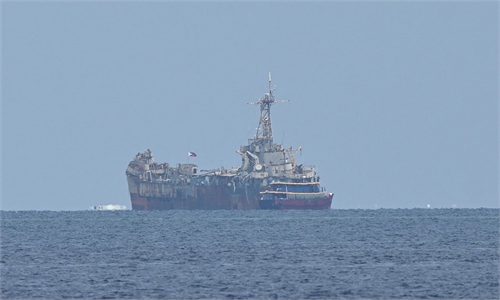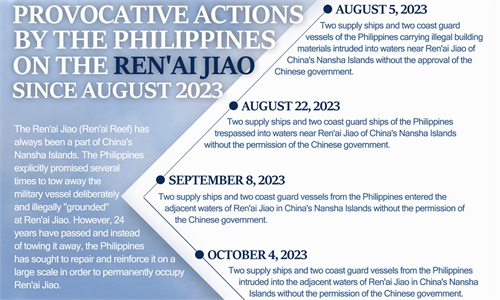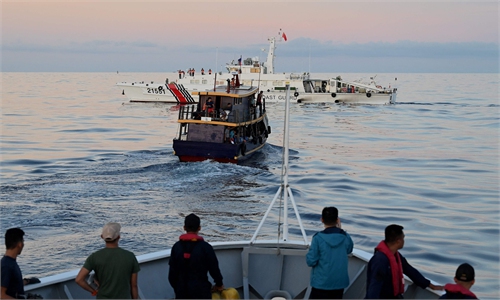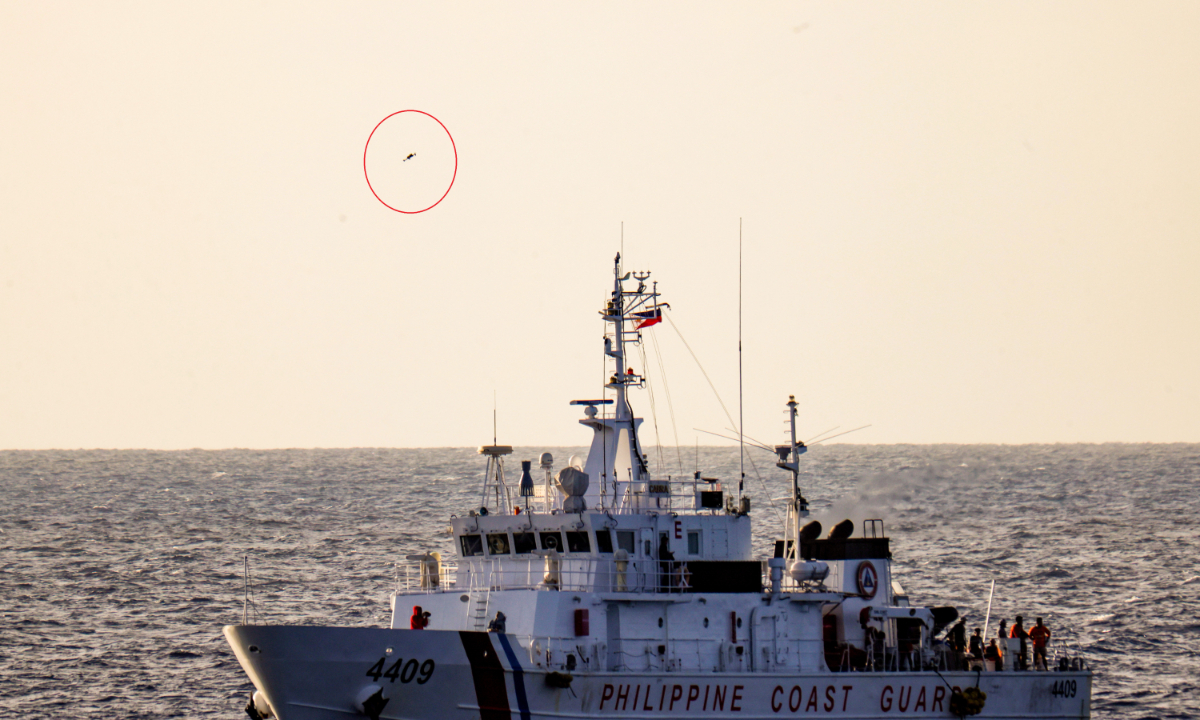
Photo shared by the source
The China Coast Guard (CCG) has monitored and tracked the entire progress of a Philippine civilian vessel that delivered supplies to a military vessel illegally "grounded" at China's Ren'ai Jiao (also known as Ren'ai Reef) on Friday, CCG said on Saturday, as the Philippines has repeatedly provoked China in the South China Sea.
The Philippines' move, which analysts called "irresponsible," came on the same day Chinese diplomats emphasized the importance of sound and stable relations between China and the Philippines and the need to properly handle maritime differences through dialogue and consultation.
Experts said on Saturday that due to China's capacity, the situation in Ren'ai Jiao is completely under control, and Beijing has been exercising restraint to avoid escalating the situation. Manila should bear in mind the overall interests of maintaining bilateral ties and stop provocations and stop wasting China's sincerity and goodwill.
Well in hand
In a short statement released on its official WeChat account Saturday, the CCG stressed that China unequivocally holds sovereignty over the Nansha Islands and adjacent waters, including the Ren'ai Jiao. It noted that the CCG will continue to carry out law enforcement activities in waters under China's jurisdiction, in accordance with law.
According to video clips and photos shared by a source to the Global Times, the CCG ship 5203 monitored a Philippine boat which transported supplies to Ren'an Reef where a Philippine warship is illegally grounded.
According to Chen Xiangmiao, director of the World Navy Research Center at the National Institute for South China Sea Studies, China has full control and law enforcement capabilities over the Ren'ai Jiao and its adjacent waters, keeping the entire situation well in hand.
We are fully aware of the Philippines' real intention and operational strategy, said Chen. "The Philippines has taken the Ren'ai Jiao issue as a tool to gain international attention and support from the US… In addition, Manila has bargained with China using the Ren'ai Jiao issue in an attempt to gain some economic benefits."
China has fully mastered the time and means of the Philippines' "supply" operation, and even the ways it counters CCG and the means of Manila's follow-up hyping via media, Chen told the Global Times.
"At present, as long as Philippine ships depart from base and sail toward the Ren'ai Reef, we will start to monitor the whole process," Chen said, "What kind of ships are involved, what is being carried on board, who is operating on board and what means will be used, we can monitor and analyze the real situation, and then develop a 'customized' response strategy."
Since August 2023, the Philippines has sent several groups of vessels trespassing into the waters off Ren'ai Jiao to send building materials to reinforce its illegally grounded warship there since 1999, attempting to permanently occupy the Chinese reef.
Given the small number of people on board the illegally grounded warship, China has long acted out of a humanitarian spirit and goodwill in greenlighting the Philippines' delivery of subsistence supplies to the ship on the Ren'ai Jiao, with a frequency of once or twice a month, but Manila must inform Beijing in advance and cannot ship construction materials to strengthen the illegally grounded warship, said Yang Xiao, deputy director of the Institute of Maritime Strategy Studies, China Institute of Contemporary International Relations.
The Philippine side is obviously aware of China's firm position on Ren'ai Jiao and diverse and effective countermeasures, which allowed China and the Philippines to reach an agreement during the Duterte tenure, Chen said.
However, the current Philippine government does not quite understand the fact that "the gains are not worth the losses," Chen said.
If the Philippines continues its provocation, China's countermeasures will further escalate, said Yang, "China has absolute sovereignty and governance rights and interests in these waters, and we will not allow the Philippines to abuse our goodwill."
Manila's provocation has only received verbal support from the US, but the cost is losing its stable ties with China, a large number of infrastructure cooperation projects… and the cost of provocations will grow larger, and it will become more likely that Manila also ruins its relations with ASEAN, Chen said.
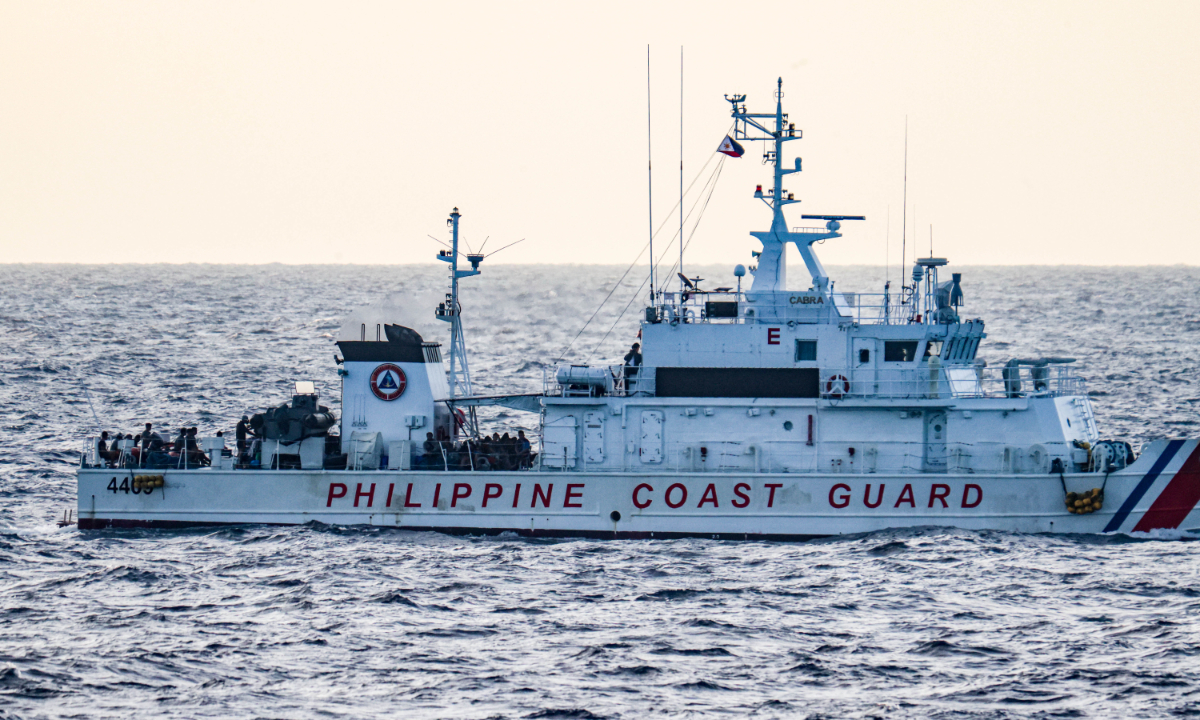
Photo shared by the source
Calm and restrained
Philippines' National Security Adviser Eduardo Año stated on January 31 that China's assertion of its sovereign rights over the Huangyan Island lacks basis of international law.
According to the spokesperson Gan Yu, the CCG also expelled four Philippine personnel who intruded into China's Huangyan Island for illegal activities on January 28, and the situation was handled professionally, according to CCG.
On Friday, Chinese Ambassador to the Philippines Huang Xilian addressed a reception in the Chinese embassy in Manila celebrating the upcoming Chinese New Year with Philippine guests.
He said the good-neighborliness and friendship will always be the basis of China-Philippines relations, which serves the fundamental interests of the two countries and is also the common aspiration of the two peoples.
The two countries' heads of state have repeatedly pointed out that China and the Philippines should properly handle maritime issues through friendly consultation and should not let maritime differences become the sole focus of bilateral relations, Huang said, noting that China-Philippines relations "are at a critical juncture."
The two sides should meet each other halfway, implement the important consensus reached by the two heads of state, conform to the trend of history and mainstream public opinion, and promote the sound and steady development of China-Philippines relations, Huang said.
On the same day, Assistant Foreign Minister Nong Rong met with Manuel Mamba, provincial governor of Cagayan in Philippines, on the sidelines of the opening activities of the China-ASEAN Year of People-to-People Exchanges held in Fuzhou, East China's Fujian Province.
Nong said that mutually beneficial cooperation and common development serve the fundamental interests of both countries, and China is committed to properly handling differences through dialogue and communication and bringing bilateral relations back to the right track. Mamba said that the Philippines and China are eternal neighbors and must get along well with each other. The two countries should resolve differences through dialogue, jointly safeguard regional peace and stability, and promote Philippine-China friendship and cooperation.
"There is no doubt that China is calm and restrained and is taking measures to avoid an escalation of the situation," a Beijing-based expert told the Global Times on Saturday, requesting anonymity.
Although some actions taken by the Philippine side are irresponsible, communication between Beijing and Manila has been constructive on the whole, he remarked.
During the recent Duterte administration, China and the Philippines were able to face the South China Sea disputes head-on and look at them in the bigger picture of bilateral ties and with a more holistic perspective, said the expert.
For disputes in sensitive areas, the two sides have adopted a "set aside" attitude, while in less sensitive areas, the two sides have chosen to accumulate more consensuses through cooperation, he noted.
"This relatively healthy cooperation dynamic of the past still has great momentum today," said the expert, "As long as the Philippine side can practice what it preaches and return to the right track, concrete and pragmatic cooperation between the two countries can still be expected."

